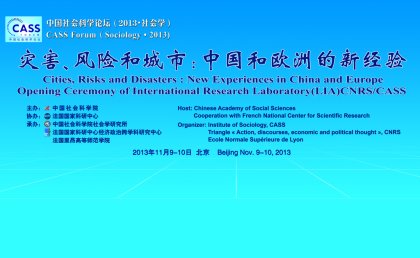
Colloque international co-organisé par l’Académie des Sciences Sociales de Chine, Institut de sociologie et le CNRS, Triangle (Cérémonie d’ouverture du LIA, jour 2) : « Cities, risks and disasters : new experiences in Europe and in China »
10 novembre 2013 à la CASS à Pékin, Chine
Brochure/Booklet
Présentation/Presentation
New risks of health, food, flood, environment and ecological disasters have produced uncertain situations, new public spaces and new inequalities in European and Chinese Cities. Risks and disasters are social phenomenas rather than natural events striking societies from the outside and are caused by social and economic vulnerabilities.
In these contexts of more or less uncertainty and of high social and physical liability, collective action and social mobilizations emerge and reveal new forms of citizenship in a new local and global public space. In this respect, we would like to analyze how new forms of citizenships are productive of new social exchanges, new solidarities, new moral economies, related to social inequalities in contemporary societies in turmoil. How are States and institutions, how are individuals and social groups involved in the fabrication of new moral economies when they are confronted to risks of health, food, flood, environment ? How are new forms of citizenships emerging in the assemblages of institutional actors, individuals, social groups ? Individuals and social groups compete for material and social goods, emergent moral economies produce new social and economic frontiers, new social and moral orders where individuals and groups have to occupy new positions and statuses.
In the case of disasters we will consider continuities and discontinuities by introducing a before and an after ; disaster is to be understood as a specific moment within social and societal processes and is to be reinscribed as a specific moment within social temporality vulnerability will be viewed as a socio-historical process of production and distribution of social fragility. Does ecological violence produce economic, social and moral violence or not ? In certain places, times and situations it could be so, but the theoretical challenge is to understand how after disaster forms of social and moral destruction, recreation, conflict and conciliation coexist together, and the social dynamics co-emergent with these interactions. Victims suffer from physical and emotional trauma. Therefore, social restoration and re-creation after natural disasters involve physical dimension as well as moral dimensions, including spirituality. Beliefs and religious organizations play an important part in the processes of restoration and re-creation of society.
In this respect, this conference is a program which seeks to understand, in uncertain contexts, the complexity of the process of recreation of Society, in European and Asian contexts, by articulating an approach of new social life, collective mobilizations and public space in CitiesPresentations are about the following topics :
- Session 1 : Risks, disasters and crisis ;
- Session 2 : Risks , disasters and mobilizations ;
- Session 3 : Risks, spatial and social differentiation ;
- Session 4 : Life exposed and new inequalities
Saturday, november the 9th, 2013
- Introduction by Li Peilin and Laurence Roulleau-Berger]
Session 1 : Risks, disasters and crisis(16:15—18:15)
- 16:15 - 16:45 Speaker 1 : Professor Claude Gilbert, Research Director CNRS, PACTE, Grenoble
Title : Risks and collective crisis. From the extraordinary to the ordinary life.
_* 16:45 - 17:15 Speaker 2 : Prof. Luo Hongguang and Liu Zhengai, Director of department of social anthropology , Institute of Sociology, CASS
Title : Social network support in the social reconstruction of Wenchuan earthquake in China - 17:15 - 17:45 Speaker 3 : Zhao Yandong, Director of institute of social development, Chinese Academy of Science and Technology for Development
Title : Rebuilding the social Trust during the post - Wenchuan earthquake reconstruction
- 17:45 - 18:15 Discussion
Sunday, november the 10th 2013
Session 2 : Risks, spatial and social differentiation(09:00—10:40)
- 09:00 - 09:30 Speaker 1 : Professor Valérie November, Research Director at CNRS, LATTS
Title : Spatial inequalities, social differentiation and individual strategies - 09:30 - 10:00 Speaker 2 : Professor He Guangxi , Institute of social development, Chinese Academy of Science and Technology for Development
Title : Urban Public perception of the risk of GM food in China - 10:00 - 10:30 Discussion
- 10:30 - 10:45 Tea Break
Session 3 : Risks , disasters and mobilizations (10:45—12:45)
- 10:45 - 11:15 Speaker1 : Dr. Sander Meijerink, Radboud University Nijmegen
Title : Flood risks and citizens in international comparative perspective - 11:15 - 11:45 Speaker 2 : Xun Lili , department of industry and rural sociology, Institute of Sociology, CASS
Title : Drought and climate change in Inner Mongolia in China - 11:45 - 12:15 Speaker 3 : Professor Toshio Sugiman and Associate Professor Motohiko Nagata, Kyoto University
Title : Survival strategies and recreation of society in Japan
- 12:15 - 12:45 Discussion
- 12:45 - 14:15 Lunch
Session 4 : Life exposed and new inequalities(14:15—16:15)
- 14:15 - 14:45 Speaker 1 : J Doctor Loïs Bastide, Triangle, ENS Lyon
Title : The moral side of disaster : religion and post - quake recognition regimes in Java - 14:45 - 15:15 Speaker 2 : Wang Xiaoyi and Li Peilin , Institute of sociology.CASS
Title : Lack of water, Poverty and Ecological migration in Ningxia Hui antonomous Region in China - 15:15 - 15:45 Speaker 3 : Professor Laurence Roulleau-Berger], CNRS, Triangle, ENS Lyon
Title : Life exposed and new inequalities after disasters in China, Japan, and Indonesia
- 15:45 - 16:15 Discussion
- 16:15 - 17:15 Conclusion and asssessment
